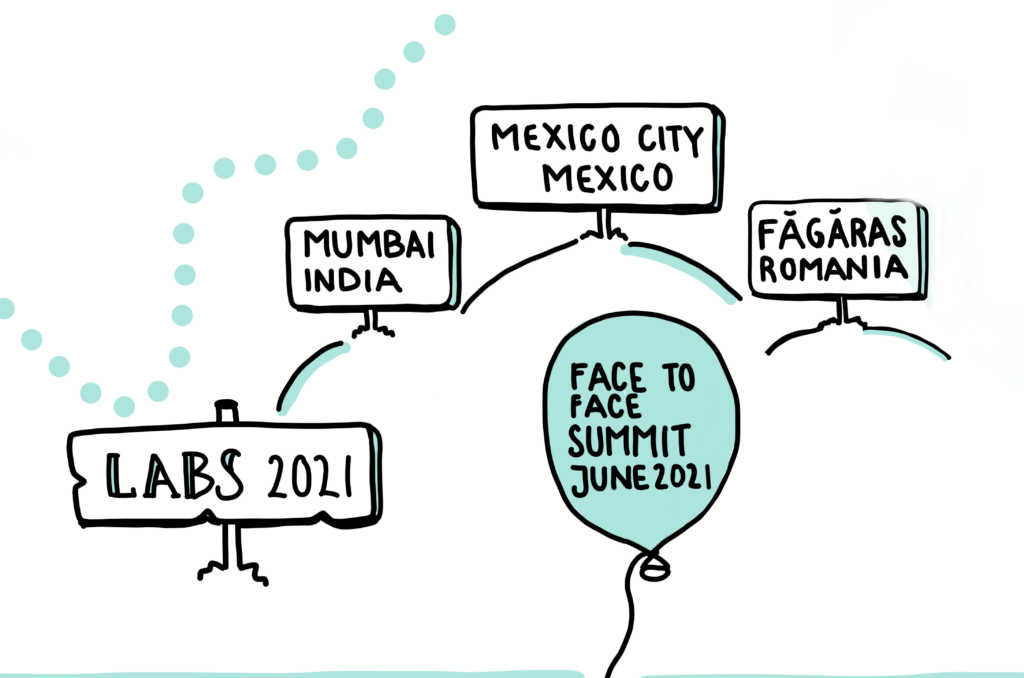Activities
And now, what’s next?

Format
Topic
And now, what’s next?
A preview of the forthcoming regional GDL Labs
2020 was going to be a special year for the GDL, celebrating its 5th anniversary. Since the planned Summit had to be moved to the next year due to the coronavirus pandemic, the May 2020 prE-Summit offered the chance for GDL members to connect with one another. The online format of the prE-Summit provided an extraordinary opportunity for the organisers of the forthcoming 2020/2021 GDL Labs – three of them, and on three different continents – to pitch their ideas and win participants for what promises to be a remarkable chance for GDL members to work on the ground and with local partners again after an extended period of online cooperation.
The possibility to learn more about what is planned and which challenges will be tackled by the planned Labs as well as the chance to pose any questions directly to the organisers helped participants of the future Labs to make an informed decision as to which topics and settings they are most interested in and would therefore like to apply for.
Starting with an online format in the autumn of 2020, the Labs in Romania, Mexico and India included in-person meetings to be scheduled for 2021. Following the application period, the Lab organisers finalised their plans for an exciting season of GDL Labs aiming to innovate diplomatic practice by engaging members from a variety of backgrounds on the ground.
The Lab in Romania was organised by GDL member Stefan Cibian. Hosted by the Făgăraș Research Institute and supported by many local partner organisations, ranging from the Town Hall to civil society organisations and the churches, participants were encouraged to ask critical questions about the role of local communities – such as the local community of Făgăraș, Romania – in the context of global affairs. These smaller towns – small in local population, but large in number if one considers the global context – often remain invisible in the context of questions relating to security, but also in terms of achievement of the SDGs. The Lab thus aimed to do crucial work in relation to rural communities and their role in international relations and the potential they may offer to refine diplomatic practice.
Hosted by the Red Dot Foundation, the Lab in India, co-organised by GDL members Elsa Marie D’Silva, Eirliani Abdul Rahman and Rudrani Dasgupta, invited participants to think about the impact of urban design on inclusive cities, and to contribute to building a more inclusive and safer city for all inhabitants. The Lab brought participants to Mumbai – a city defined by its staggering contrasts: a city of dreams for some, a slum for others. Taking into account SDGs 5, 11 and 17, the Lab aimed to provide an insight into how to examine intersectionality as well as to improve governance and accountability for the city in the long run. This Lab was an excellent opportunity to develop and try out a model for an inclusive city that could also be applied elsewhere.
The third Lab, organised by GDL members Edna Martinez and Carolina Sheinfield and hosted by UNDP Mexico, brought the GDL to Mexico City, but its focus will be beyond that city. The Lab addressed the role of public diplomacy in Northern Central America – one of the most important regions affected by ongoing migration due to the borders between El Salvador, Guatemala and Mexico. The Lab aimed to examine this phenomenon and consider it under the headings of sustainability, social justice and economic growth. Defining migration as a multidimensional phenomenon, the Lab profited from the diversity of its participants and offered new approaches to furthering transnational cooperation between non-government actors that could also be used in other fields.
For the GDL, united by the idea of supporting local populations and local actors, 2021 turned out to be a successful year – one of ongoing international and interdisciplinary involvement, of developing new ideas for global diplomacy and of contributing to a fairer and more sustainable world after COVID-19.